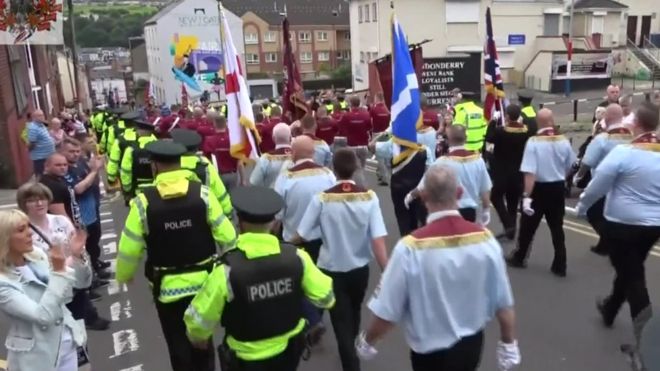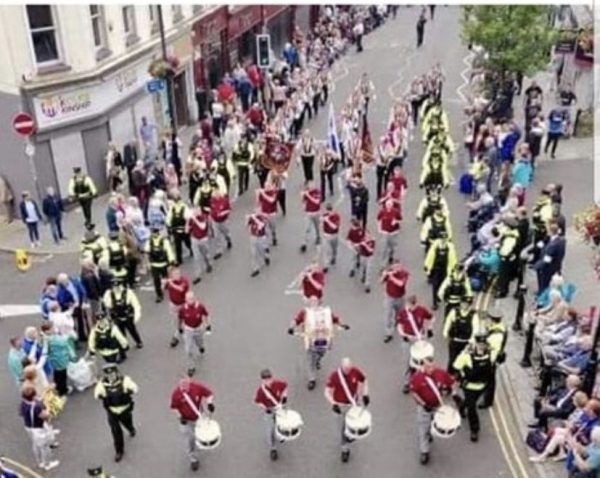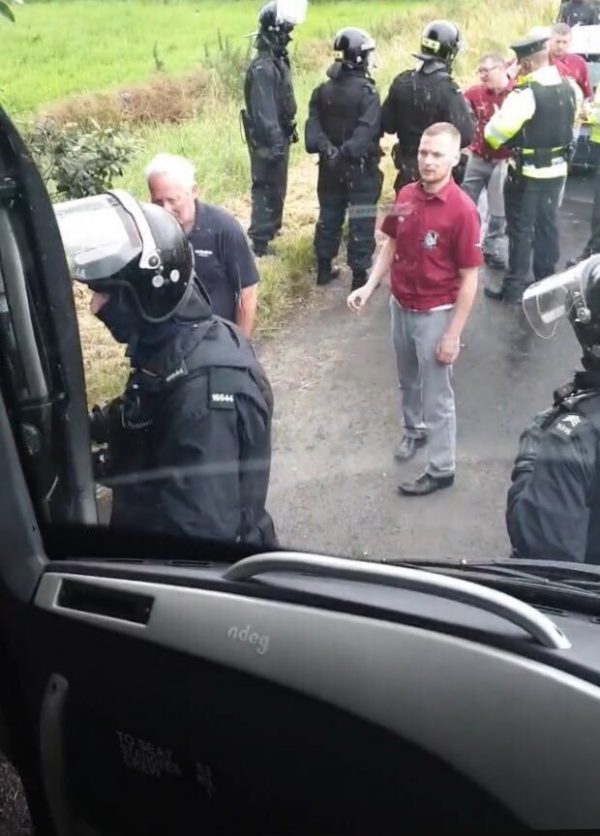
Police flanked Clyde Valley Flute Band during Apprentice Boys parade in Derry in August 2019
It comes almost two years after the Clyde Valley Flute Band wore Parachute Regiment insignia with a letter ‘F’ underneath in support of a British soldier charged with murdering innocent civilians in Derry.
Three people were reported to police for an alleged public order offence at the parade on August 10, 2019.
Thirteen people were killed and fifteen wounded when members of the British Army’s Parachute Regiment opened fire on civil rights demonstrators on Bloody Sunday in 1972.
An ex-paratrooper known as Soldier F is charged with murdering Jim Wray and William McKinney.
He’s also charged with attempting to murder Patrick O’Donnell, Joseph Friel, Joe Mahon and Michael Quinn, as well as attempting to murder a number of persons unknown.
Bloody Sunday families viewed the band’s actions on August 10, 2019, as a ‘deliberate’ attempt to cause hurt and heighten tensions.
The PPS considered whether the wearing of these shirts amounted to an offence of provocative conduct having regard to all the circumstances including the location of the parade, the findings of the Bloody Sunday Inquiry, and the pending prosecution of Soldier F for offences including murder.
Several requests for further information were made to police to ensure that all relevant evidence was obtained and properly taken into account.
The offence of provocative conduct has two limbs.
The first arises where a person displays something, or does any act in any public place, with intent to provoke a breach of the peace.
The second arises where the conduct is likely to result in a breach of the peace or public disorder, whether or not there was any specific intent that it should do so.
PPS Assistant Director Martin Hardy said: “A Senior Public Prosecutor, assisted by advice from independent Senior Counsel, carefully considered all the available evidence and information reported on a police investigation file.
“It was concluded that the Test for Prosecution was not met in respect of any offence for any of the three individuals on evidential grounds.

Police surround Clyde Valley Flute Band at Apprentice Boys parade in Derry in August over Soldier F symbols on their uniforms to prevent breach of the peace
During the march the PSNI intervened to escort the Clyde Valley Flute Band from Larne around the main parade but it was prevented from taking part in the return leg.
The band’s bus was stopped by the PSNI on the way home.
Afterwards, Bloody Sunday families said they were ‘disgusted’ and felt it was a deliberate attempt to antagonise them.
They said the band should never be allowed to march in the city again.
Disorder followed in the Bogside during which petrol bombs were thrown at the Apprentice Boys’ memorial hall and the City Walls.
Several days later the Apprentice Boys of Derry offered an apology saying that it recognised the potential upset caused to nationalists.
Families of the victims of Bloody Sunday then had a ‘cordial and constructive’ meeting with the Apprentice Boys with a view to restoring positive relations in the city.
The considerations that informed today’s PPS conclusion included the context of the event, which, the PPS says was an annually held loyal order parade at which symbols of British military pageantry would be anticipated.

Police stop Clyde Valley Flute Band bus on the outskirts of Derry in August 2019
According to the PPS, there was an absence of any clear evidential link between the conduct of the suspects and the public disorder that took place on the evening of the parade
The difficulty in proving any specific intent on the part of the reported individuals and the fact that, under the second limb of the offence, the prosecution is required to prove that violence, or threatened violence, was the likely effect of the suspects’ conduct.
Proof of a mere risk or possibility of a breach of the peace would not suffice.
The third reported individual had worn a replica military uniform which did not bear any emblem relating to the Parachute Regiment or Soldier F.
It was concluded that there was nothing worn, or done, by this individual in the course of the parade that provided any separate basis for prosecution.
Mr Hardy added: “Although it was concluded that the wearing of the emblems did not provide a basis for prosecution, we recognise the sensitivities and concerns arising from the conduct of the Clyde Valley Flute Band in Derry on 10th August 2019.
“Those sensitivities and concerns were recognised by the band itself when it withdrew from a subsequent parade in December 2019.
“The decision not to prosecute is a judgment as to the likely prospects of proving an offence in the context of a criminal trial and should in no way be seen as diminishing the hurt that the conduct may have caused, not least to the victims and loved ones of those killed on Bloody Sunday.”
Tags:




